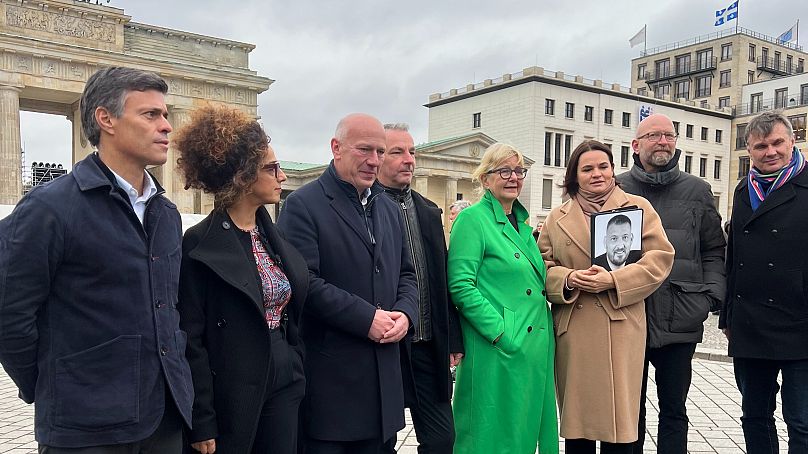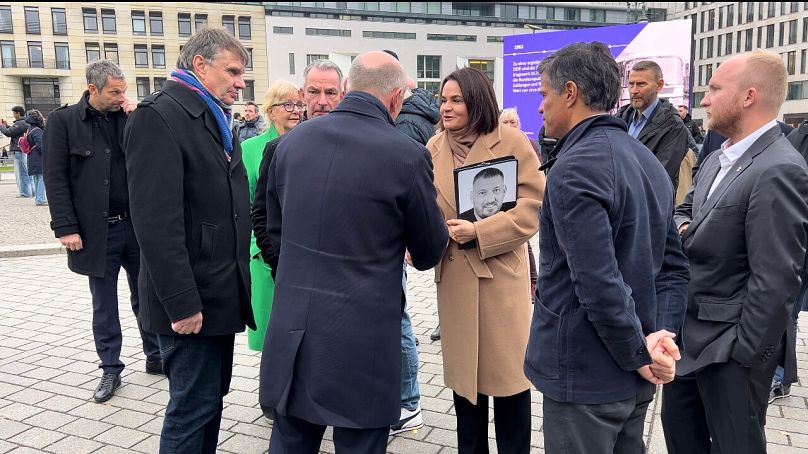Sviatlana Tsikhanouskaya, líder da oposição bielorrussa, fez os comentários à Euronews por ocasião do 35º aniversário da queda do Muro de Berlim.
No sábado, os alemães festejaram o 35º aniversário da queda do Muro de Berlim, que durante anos dividiu a cidade entre Leste e Oeste durante a Guerra Fria.
A 9 de novembro de 1989, a Alemanha de Leste comunista abriu as suas fronteiras, permitindo aos cidadãos viajar livremente para o Ocidente pela primeira vez em décadas.
A líder da oposição bielorrussa, Sviatlana Tsikhanouskaya, falou com a Euronews em Berlim sobre a repressão que continua a ser exercida no seu país. Para muitos cidadãos bielorrussos, a queda do Muro de Berlim tem um significado muito especial.
"Para os bielorrussos, o Muro de Berlim tem um significado simbólico muito importante. É isso que os bielorrussos, em certa medida, vivem atualmente", afirmou Tsikhanouskaya.
"O muro dividia Berlim Oriental de Berlim Ocidental, uma vida melhor de uma vida pior. O que era um muro físico (em Berlim), é agora um muro político na Bielorrússia", afirma Tsikhanouskaya.
Depois da queda do muro, as pessoas que tinham estado separadas da família e dos amigos durante mais de 28 anos puderam finalmente reunir-se, tal como a Alemanha, que voltou a fazer de Berlim a sua capital.
Tsikhanouskaya: "O Muro de Berlim não caiu por si só".
Tal como os que viveram na antiga Alemanha de Leste, os bielorrussos suportam a repressão do regime de Alexander Lukashenko, mas só eles próprios podem pôr-lhe cobro, insiste Tsikhanouskaya.
"O Muro de Berlim não caiu por si só", sublinha. "O povo alemão lutou diariamente pela queda desse muro".
Tal como os alemães ocidentais encorajaram os alemães orientais a lutar pela sua liberdade, também o povo bielorrusso precisa agora do apoio das democracias de todo o mundo, afirmou Tsikhanouskaya.
"Estou certa de que o muro na Bielorrússia vai cair. Claro que isso depende de nós, bielorrussos, mas também da solidariedade global".
"Não podemos destruir este muro político sozinhos. Precisamos de aliados. Precisamos de solidariedade. Precisamos de ajuda", insistiu Tsikhanouskaya.
"Quando sentimos a solidariedade, sentimo-nos realmente inspirados".
O papel das democracias ocidentais
"A Bielorrússia está na linha da frente da luta contra uma ditadura", mas para que o muro político de Lukashenko caia, o Ocidente precisa de continuar a exercer uma forte pressão sobre a sua ditadura, diz Tsikhanouskaya.
Ajudar o povo bielorrusso no seu difícil caminho para a liberdade significa responsabilizar os culpados, afirmou: "As pessoas na Bielorrússia devem sentir que todos os crimes não ficarão impunes".
Muitas pessoas na Bielorrússia tentaram ganhar a liberdade em 2020, quando protestaram contra a falsificação dos resultados eleitorais que mantiveram Lukashenko no poder. Alguns foram brutalmente espancados pela polícia, combatentes da liberdade foram presos e alguns tiveram de fugir para o exílio.
Mas, segundo Tsikhanouskaya, o Muro de Berlim não caiu de repente por si só e o regime de Lukashenko também não vai cair. "Foi preciso o trabalho humilde de muitas, muitas pessoas naquela altura".
Credito: Euronews
'Political wall' in Belarus will collapse, says opposition leader
Belarusian opposition leader Sviatlana Tsikhanouskaya made the comments to Euronews on the 35th anniversary of the fall of the Berlin Wall.
Germans were celebrating the 35th anniversary of the fall of the Berlin Wall on Saturday that had divided the city into east and west for years during the Cold War.
On Nov. 9, 1989 communist East Germany threw open its borders, allowing citizens to travel freely to the West for the first time in decades.
Belarusian opposition leader Sviatlana Tsikhanouskaya spoke with Euronews in Berlin about the continuing repression inside her own country. For many Belarusian citizens, the fall of the Berlin Wall has a very special meaning, she said.
"For Belarusians, the Berlin Wall has a very important symbolic meaning. This is, what Belarusians, to some extent, experience at the moment," Tsikhanouskaya stated.
"The wall divided East Berlin from West Berlin, a better life from a worse life. What was a physical wall (in Berlin), is now a political wall in Belarus", says Tsikhanouskaya.
After it fell people who had been separated from family and friends for over 28 years, could finally reunite, as could Germany which then made Berlin its capital again.
Tsikhanouskaya: "The Berlin Wall did not fall by itself"
As with those who had lived in former East Germany, people in Belarus endure the repression of Alexander Lukashenko's regime, but only they themselves can stop it, Tsikhanouskaya insists.
"The Berlin Wall did not fall by itself," she stressed. "The German people fought daily for the fall of this wall."
Just as West Germans encouraged East Germans to fight for their freedom, so the Belarusian people now need support from democracies around the world, Tsikhanouskaya stated.
"I am certain that the wall in Belarus will collapse. Of course, it depends on us Belarusians, but also on global solidarity."
"We can't destroy this political wall all by ourselves. We need allies. We need solidarity. We need assistance," Tsikhanouskaya urged.
"When you feel solidarity," Tsikhanouskaya said, "you really feel inspired."
The role of western democracies
"Belarus is on the front line of the fight against a dictatorship," but for Lukashenko’s political wall to fall, the west needs to continue building strong pressure on his dictatorship, says Tsikhanouskaya.
Helping the Belarusian people on their difficult path to freedom means holding the perpetrators to account, she stated: "People in Belarus should feel that all the crimes will not go unpunished."
Many in Belarus tried to gain their freedom in 2020 when they protested against the falsified election result that kept Lukashenko in power. Some were brutally beaten by the police, freedom fighters were put into jail, and some had to flee into exile.
But, the Berlin Wall did not suddenly collapse by itself either, says Tsikhanouskaya, and neither will Lukashenko's regime. "It took the humdrum work of many, many people at that time."
Credito: Euronews











Nenhum comentário:
Postar um comentário